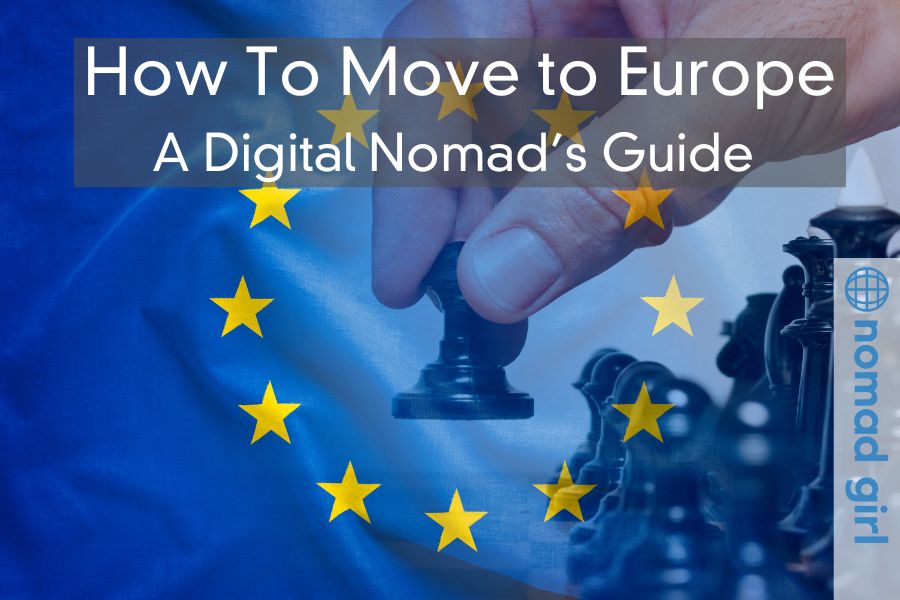Moving to Europe as a digital nomad offers an incredible opportunity to embrace a lifestyle that combines work and exploration. With a rich blend of diverse cultures, stunning landscapes, and efficient infrastructure, Europe has become a top destination for remote workers. Whether it’s for better work-life balance, exposure to new ideas, or cost-effective living, this continent can provide unparalleled advantages.
Read on to learn how to move to Europe without any hassle.
Research and Prepare
Relocating to Europe as a digital nomad requires meticulous research and preparation. By planning ahead, you can navigate legal requirements, cultural differences, and logistical challenges, setting the foundation for a successful move.
Below are some research and preparation strategies to consider:
Visa Requirements for Digital Nomads
Europe offers various visa options tailored for remote workers. Each country has its regulations, so researching eligibility requirements is essential. Popular digital nomad visas include:
- Portugal’s Digital Nomad Visa: Ideal for freelancers and entrepreneurs, this visa allows remote workers to live and work in Portugal for up to one year.
- Spain’s Non-Lucrative Visa: This Spain’s digital Nomad Visa can be a great option for those who can demonstrate financial self-sufficiency, although employment with a Spanish company isn’t permitted.
- Estonia’s Digital Nomad Visa: One of the first visas of its kind, it offers a straightforward process for remote workers with verified income streams.
However, to ensure compliance with immigration laws, it’s crucial to consult with a legal expert or embassy representative in your chosen destination.
Budgeting for Your Move
Moving abroad requires thorough financial planning. Consider costs such as flights, initial accommodation, visa fees, and affordable living costs in your chosen destination. Also, research average monthly rent, groceries, and utilities costs in various cities. Many digital nomads recommend starting with a buffer of at least three months’ worth of expenses.
Healthcare and Insurance
Healthcare systems vary widely across Europe. While some countries like Spain and France offer world-class public healthcare, others might require private insurance. Hence, looking into international health insurance plans catering to expats and digital nomads is best. Lastly, ensure your coverage includes emergency medical evacuation and outpatient services.
Choose the Right Destination
Understanding the best places to live in Europe is crucial for digital nomads seeking an optimal balance between affordability, accessibility, and quality of life. Fortunately, Europe is filled with cities and towns perfectly suited to meet these needs.
Therefore, when selecting a base, prioritize factors such as internet connectivity, cost of living, climate, and cultural fit. For instance, cities like Lisbon, Budapest, and Prague are popular for their affordability, thriving digital nomad communities, and reliable infrastructure. Conversely, destinations such as Stockholm or Zurich may appeal to those with higher budgets and a preference for colder climates.
Furthermore, urban centers like Berlin and Barcelona offer coworking spaces, networking opportunities, and diverse activities. However, rural areas in countries like Italy or Slovenia may provide tranquility and lower costs, which is appealing if you’re seeking a slower pace.
Find Accommodation

Securing comfortable and affordable housing is a top priority when moving to Europe. For instance, digital platforms can help you find short-term accommodation while you search for a permanent place. For longer stays, exploring local rental websites, social media groups, or expat forums can also be an excellent idea. However, keep in mind that rental contracts in Europe typically require deposits and proof of income.
Moreover, coliving spaces are increasingly popular among digital nomads. These shared living arrangements include coworking areas, communal kitchens, and networking events, making them ideal for newcomers.
Set Up a Remote Work Environment
A reliable digital workspace is essential for maintaining productivity while living abroad. Europe offers various coworking spaces equipped with high-speed internet, networking opportunities, and a professional atmosphere. Some considerations for setting up your workspace include:
Coworking Spaces
Europe boasts a wealth of coworking spaces equipped with high-speed internet, ergonomic seating, and meeting rooms. Many spaces cater specifically to remote workers, providing networking opportunities alongside a productive work environment.
Essential Tech Gear
Another factor to consider when setting up a remote working space is the essential tech gear. For instance, investing in portable and reliable tech tools such as noise-canceling headphones, a travel-friendly laptop, and power adapters suitable for European outlets is important. Cloud-based storage solutions and VPNs are also essential for securing your online work.
Moving to a new country involves adapting to its culture and language. For example, while English is widely spoken in many European cities, learning basic phrases in the local language can significantly enhance your experience. Fortunately, many platforms are excellent for acquiring conversational skills.
Furthermore, cultural norms vary significantly across Europe. For instance, punctuality is highly valued in Germany, whereas social interactions in Italy or Spain tend to be more relaxed. As such, it’s essential to familiarize yourself with local customs to ensure smooth interactions.
Manage Finances
Managing finances while living in Europe requires careful planning. Some key considerations include:
Banking and Currency
Open an international bank account or choose a digital bank for seamless transactions in multiple currencies. Many of these services also offer low fees for international transfers and ATM withdrawals.
Taxes and Legal Obligations
Consult with a tax advisor to understand your obligations in your home country and Europe. Some countries have double taxation agreements that can simplify the process. Digital nomad visas may also come with specific tax benefits.
Build a Social Network

Relocating can feel isolating, but building a support network mitigates loneliness and enriches the experience. In this case, you can participate in digital nomad meetups, language exchange events, or expat groups on many platforms. These gatherings can help you build a support system, share resources, and form friendships.
Moreover, you may leverage online platforms, which are excellent resources for connecting with other remote workers. These platforms can provide insights into the best cities, coworking spaces, and social events tailored for digital nomads.
Final Thoughts
Moving to Europe as a digital nomad is a transformative experience, combining travel excitement with remote work’s stability. By keeping the information mentioned above in mind, you can ensure a smooth transition and create a fulfilling lifestyle that balances professional growth with personal discovery. Whether you’re drawn to the historic charm of Eastern Europe or the sunny coasts of the Mediterranean, Europe offers countless opportunities to thrive as a digital nomad.


















